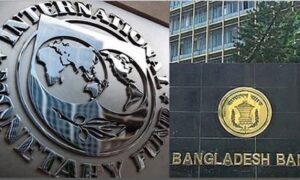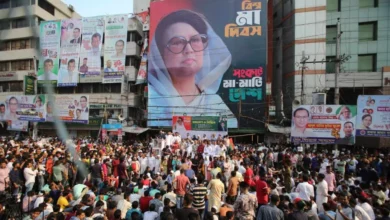IMF wants accountability of Bangladesh Bank
The International Monetary Fund (IMF) has recommended ensuring transparency and accountability of the overall operations of Bangladesh Bank on a priority basis. At the same time, it has been said to increase the power by ensuring the autonomy of the central bank.
Besides, the Central Bank has asked to stop the priority sectors which are given loans. Commercial banks have proposed to increase the cash reserve ratio (CRR) at the central bank to protect depositors’ money. For this purpose, Bangladesh Bank has recommended to amend the order. The agency also insists on setting its rates based on demand and supply of the dollar.
These recommendations have been made in a report titled ‘Bangladesh: Technical Assistance Report – Adoption of Interest Rate Corridor’ published by the IMF on Friday night. A mission of IMF and World Bank visited Bangladesh from July 5 to 17 last year. They observed the various activities of the Central Bank and reviewed the legal framework. Based on this they prepared the report.
Earlier on Thursday, the IMF waived $114.7 million for the third tranche of the loan given to Bangladesh. Another IMF mission will arrive next November to assess progress in implementing the terms of the fourth tranche of the loan. If the evaluation is positive, the fourth installment will be available in December. For this reason, those conditions must be implemented within December.
The report asked the financial sector, including Bangladesh Bank, to implement several recommendations on a priority basis to ensure transparency in the foreign exchange market and the local currency market. For this purpose, it has been said to amend the Bangladesh Bank Order to ensure the autonomy of the central bank and give them the power to make independent decisions on monetary policy.
According to the sources, although the monetary policy is currently formulated by the central bank, the central bank cannot decide independently in many cases. The decision imposed by the government has to be implemented. As a result, problems arise in monetary policy. This increases the rate of inflation. The central bank has to take responsibility.
According to the IMF, monetary management should be guided by monetary policy. Financial management should be controlled through this. Inflation, interest rate, dollar value should be controlled through the use of various instruments of monetary policy.
According to sources, currently the interest rate is market-based, but it has not been fully implemented. The value of the dollar is determined by a system imposed by the central bank. The effectiveness of using different instruments of monetary policy is not consistent in all cases.
The IMF said, transparency and accountability should be ensured regarding the overall activities of Bangladesh Bank. There is a lack of accountability in various functions of the central bank. For this reason, it has been said to increase the power of the Central Bank Board.
According to those concerned, the government’s interference in the work of the central bank is increasing. Due to which there is no transparency and accountability of work. The current plight of the banking sector is blamed on the lack of accountability and good governance of the central bank.
At present, the central bank provides low interest loans by forming funds with the central bank’s own money in the priority banks of the government. The IMF has asked the central bank to stop lending to these sectors. According to the organization, the central bank will formulate and supervise financial sector policies. If they disburse loans like commercial banks, there will be disruption in the supervisory system.
At present the policy rate is the Treasury bill repurchase agreement or the repo rate. Earlier Bank Rate was considered as the policy rate. Bank rate should now be taken into account as the policy interest rate, the IMF said. Currently the bank rate is 4 percent. As it is not the policy interest rate, it is not being increased. Rather, the repo interest rate has been increased to 8.5 percent as the policy rate to increase the interest rate.
To ensure the safety of depositors’ money, banks are required to deposit 4 percent of their total deposits with the central bank in the form of cash or as CRR. This rate was higher earlier. The central bank reduced the CRR deposit rate to increase the liquidity of the banks. This has increased liquidity in the bank.
The IMF has said that the CRR deposit rate of the banks should be further increased for the safety of the depositors. Reforms are also recommended in the penalty regime imposed by the central bank on commercial banks due to CRR shortfalls.
Major reforms have also been recommended in the way the dollar is priced in the foreign exchange market. Its rate setting system should be introduced based on the flow and demand of dollars in the market.
Henceforth the central bank will have to forecast the liquidity situation of the commercial banks in advance. This will improve the currency market situation. Interest rate movements will be understood. Advance forecasting of liquidity will help in determining market based and competitive interest rates. Targeted financial policy should be formulated through these steps.





